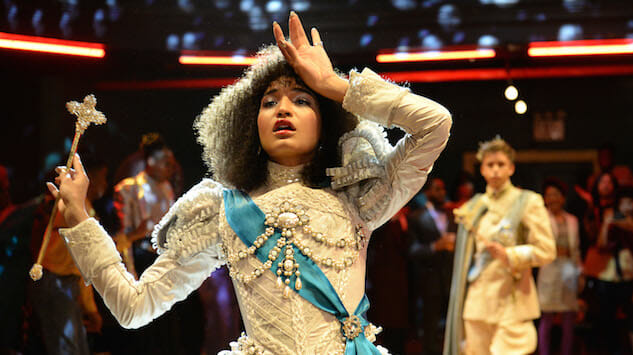Why Pose Is the Perfect Accompaniment to Your Summer of Rage
Photo: JoJo Whilden/FX
A bitch cannot hide her song, honey. It oozes out of you. —Pray Tell, Pose (Episode 1.06)
In Sunday night’s episode of Pose, the sensational new series from Ryan Murphy, Brad Falchuk, and Steven Canals, ballroom impresario Pray Tell—the extraordinary Billy Porter, focusing his livewire charm into a silver-tongued laser beam—spins MFSB’s soul anthem “Love Is the Message” on a weeks-long loop. Recently diagnosed with HIV, his lover living out his last days on a hospital ward for AIDS patients, Pray spends much of the hour drinking hard, lashing out, lamenting the defining crisis of the era. It’s New York circa 1988, and Pray is desperate to recapture, or at least remember, an age before the virus linked one of life’s most intimate acts to its ultimate end: the summer of 1980, as he explains to his boyfriend, of Fire Island and “Love Is the Message,” when they were still “free to love, free to fuck, free to be our gay-ass selves.”
Though the song’s repetition frustrates the ball scene’s youngsters (“This song is a classic,” Dominique Jackson’s elder stateswoman, Elektra Abundance, retorts with a sniff), Pray’s rationale for playing it is, in fact, the clarion call of Pride: Pride is presence, the refusal to be shouted down, erased, ignored, shamed. It is also, of course, resistance: Pride originated with the first anniversary of the Stonewall riots, in which queer people of color—those at the bright, unabashed heart of Pose—played a central role. Long before “Love Is the Message” offers up back-to-back renditions of “For All We Know” and “Home,” then, the episode, co-written and directed by Janet Mock, emerges as the message’s proof, the installment of FX’s blistering drag/dance musical that best encapsulates Pray’s admonition against hiding. In this sense, more than “I Like It,” “Slow Burn, “Boo’d Up,” or any of the other contenders, Pose is truly the song of this summer, an ecstatic, mad hot bop for a season of rage.
After all, as Pray suggests, the song that defines a particular moment isn’t necessarily the track at the top of the charts: Pose itself conjures up the raucous queer counterculture of Gordon Gekko’s New York with reference, among others, to Desperately Seeking Susan, Whitney Houston, Falconcrest, and Anna Wintour. (Some things never change.) The point is, an electric melodrama of warring houses set within a wider crisis seems more than à propos for the summer of 2018, a sort of Babylon Berlin for our Republican Reich: Pose is an object lesson in the ongoing nature of struggle, full of shape shifters, fierce queens, underdogs, wits, all scrappers to the last. (The same can be said of both its on- and off-screen talent, which includes trans women writers Our Lady J and Mock—now the first trans woman of color to direct an episode of television—and the largest cast of transgender actors in the history of scripted TV.) Against the personal and political troubles met by protagonist Blanca Rodriguez (Mj Rodriguez), an HIV-positive trans woman of color who breaks with Elektra in the pilot episode to form her own house, the battles ahead—in the midterm elections, against a Supreme Court that threatens to roll back or blockade LGBTQ rights, for an end to the murders of trans women and the epidemic of queer youth homelessness, toward a future in which the AIDS crisis is actually over, and not just in the fantasies penned by privileged white men—appear only as consequential as they always have. Pose simply reminds us, more in the furious vein of Angels in America and The Normal Heart than the maudlin one of Philadelphia and Dallas Buyers Club, that the fight for our lives was and remains literal: Queer people don’t need Gilead to imagine a nation that wishes us dead.
-

-

-

-

-

-

-

-

-

-

-

-

-

-

-

-

-

-

-

-

-

-

-

-

-

-

-

-

-

-

-

-

-

-

-

-

-

-

-

-








































